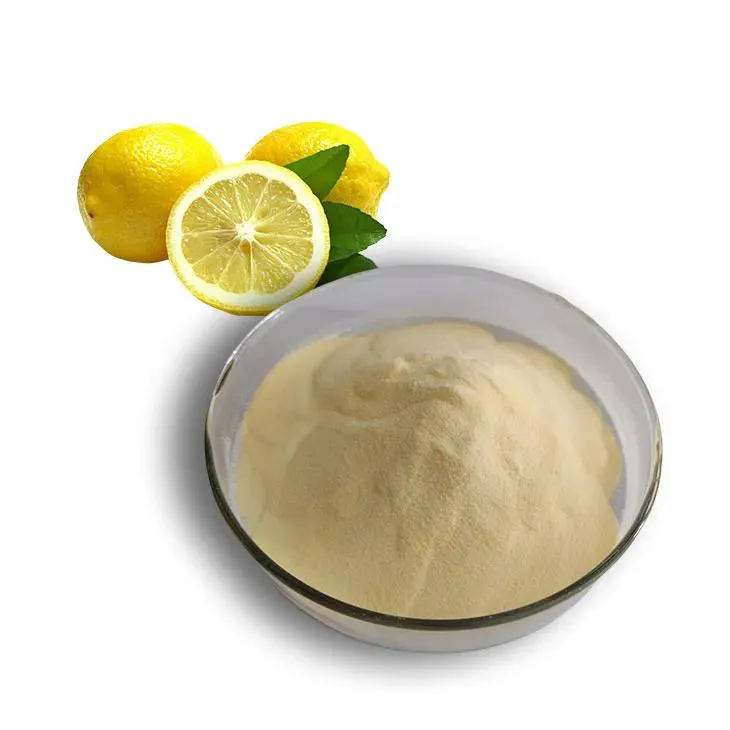- 0086-571-85302990
- sales@greenskybio.com
Emerging Trends and Competitive Strategies in the Lemon Juice Powder Market.
2024-12-12

1. Emerging Trends in the Lemon Juice Powder Market
1.1 The Rise of Organic and Healthy Options
In recent years, there has been a significant rise in the demand for organic Lemon Juice Powder. Consumers are becoming more health - conscious and are increasingly seeking products that are free from pesticides, chemicals, and artificial additives. Organic Lemon Juice Powder is perceived as a pure and natural alternative to conventional products.
One of the main drivers behind this trend is the growing awareness of the potential health risks associated with non - organic food products. For example, pesticides used in conventional farming can leave residues on the lemons, which may be present in the juice powder as well. By choosing organic lemon juice powder, consumers can reduce their exposure to these potentially harmful substances.
Moreover, organic products are often associated with better taste and quality. Organic lemons are typically grown in more natural and sustainable farming environments, which can result in a more intense and authentic lemon flavor in the powder form. This is particularly appealing to consumers who use lemon juice powder in cooking, baking, or for making beverages, as they are looking for a high - quality ingredient to enhance the flavor of their creations.
1.2 Expansion into New Application Areas
The lemon juice powder market is also experiencing an expansion into new application areas. Traditionally, lemon juice powder has been mainly used in the food and beverage industry, for example, in the production of lemon - flavored drinks, desserts, and salad dressings. However, in recent years, its applications have extended beyond the kitchen.
In the beauty and skincare industry, lemon juice powder is being used in various products. Lemon is known for its natural bleaching and exfoliating properties. Lemon juice powder can be added to face masks, scrubs, and body lotions to help brighten the skin, reduce blemishes, and exfoliate dead skin cells. This new application area has opened up a whole new market segment for lemon juice powder manufacturers, as the beauty and skincare market is constantly growing and consumers are always on the lookout for natural ingredients.
Another emerging application area is in the household cleaning products. Lemon's natural antibacterial and deodorizing properties make it an ideal ingredient for cleaning products. Lemon juice powder can be used in homemade or commercial cleaning solutions for countertops, floors, and even in laundry detergents to add a fresh scent and help remove stains. This trend is driven by the increasing consumer preference for natural and environmentally - friendly cleaning products, as they are perceived as safer for the family and the environment compared to chemical - based cleaners.

2. Competitive Strategies in the Lemon Juice Powder Market
2.1 Building Strong Brand Identities
In a highly competitive lemon juice powder market, building a strong brand identity is crucial for companies to stand out from the crowd. A strong brand identity can help create customer loyalty, increase brand recognition, and ultimately drive sales.
One way to build a strong brand identity is through consistent branding across all marketing channels. This includes having a recognizable logo, brand colors, and a consistent brand voice in all advertising, packaging, and online presence. For example, a brand that positions itself as a high - quality, organic lemon juice powder provider may use earth - tone colors in its packaging, and have a logo that features a lemon orchard to convey a sense of naturalness and authenticity.
Storytelling is also an important aspect of building a brand identity. Brands can tell the story of how their lemon juice powder is sourced, produced, and the benefits it offers to the consumers. For instance, a company can share how they work directly with local farmers to source the freshest lemons, and how their unique production process preserves the natural nutrients and flavors of the lemons. By sharing these stories, brands can connect with consumers on an emotional level, making them more likely to choose their product over competitors.
2.2 Leveraging E - commerce Platforms
The growth of e - commerce has revolutionized the way products are sold and marketed, and the lemon juice powder market is no exception. Leveraging e - commerce platforms can provide several advantages for lemon juice powder manufacturers and sellers.
Firstly, e - commerce platforms offer a wider reach and access to a global customer base. A small - scale lemon juice powder producer that may have limited distribution channels in the physical world can now easily sell its products to customers all over the world through online marketplaces such as Amazon or Alibaba. This significantly increases the market potential and sales opportunities for the company.
Secondly, e - commerce platforms provide valuable data and analytics that can be used to understand customer behavior, preferences, and market trends. By analyzing this data, companies can optimize their product offerings, pricing strategies, and marketing campaigns. For example, they can identify which regions have the highest demand for their lemon juice powder, what flavors or product variants are most popular, and at what price points customers are most willing to buy.
In addition, e - commerce platforms also enable companies to interact directly with customers through features such as customer reviews, ratings, and Q&A sections. This direct interaction allows companies to address customer concerns, build relationships, and improve their products based on customer feedback.
2.3 Forging Strategic Partnerships
Forging strategic partnerships can be an effective competitive strategy in the lemon juice powder market. Strategic partnerships can take various forms, such as partnerships with suppliers, distributors, or other complementary brands.
Partnerships with suppliers can ensure a stable and high - quality supply of raw materials. For example, a lemon juice powder company can form a partnership with a lemon - growing farm to secure a consistent supply of fresh lemons. This can help the company avoid supply shortages, maintain product quality, and potentially negotiate better prices for the raw materials.
Partnerships with distributors can improve the company's distribution network and market penetration. A well - established distributor can have an extensive network of retail stores, supermarkets, and online marketplaces, which can help the lemon juice powder reach a wider audience. For instance, a partnership with a major food distributor can ensure that the product is available in more grocery stores across different regions.
Another type of strategic partnership is with complementary brands. For example, a lemon juice powder brand can partner with a baking mix brand to create co - branded products or cross - promote each other's products. This can help both brands reach new customer segments and increase brand awareness. For instance, the baking mix brand can promote the use of the lemon juice powder in its recipes, while the lemon juice powder brand can promote the baking mix as a great accompaniment to its product.

3. Conclusion
The lemon juice powder market is evolving rapidly, with emerging trends such as the rise of organic and healthy options and expansion into new application areas. To succeed in this competitive market, companies need to adopt effective competitive strategies, including building strong brand identities, leveraging e - commerce platforms, and forging strategic partnerships. By staying aware of these trends and implementing the right strategies, companies in the lemon juice powder market can position themselves for long - term growth and success.

FAQ:

What are the main emerging trends in the lemon juice powder market?
The main emerging trends in the lemon juice powder market include the increasing popularity of organic and healthy options. Consumers are more health - conscious nowadays and are inclined towards products that are free from pesticides and artificial additives. Another trend is the expansion into new application areas. For example, it is being used more in the food and beverage industry not just for traditional uses like making lemonade, but also in new product formulations such as in baked goods, salad dressings, and even in some cosmetic products.
How can companies build strong brand identities in the lemon juice powder market?
Companies can build strong brand identities in the lemon juice powder market in several ways. Firstly, by focusing on product quality and consistency. High - quality lemon juice powder that delivers consistent taste and flavor will earn the trust of consumers. Secondly, through effective packaging design. Eye - catching and informative packaging can attract consumers' attention on the store shelves. Also, by communicating a clear brand message. This could involve highlighting the product's origin, production process, and any unique selling points such as being sourced from a particular region known for its high - quality lemons or using a special production technique to preserve the freshness of the lemon flavor.
What are the benefits of leveraging e - commerce platforms in the lemon juice powder market?
Leveraging e - commerce platforms in the lemon juice powder market has several benefits. It provides a wider reach as it allows companies to access customers from different geographical locations without the need for a large number of physical stores. E - commerce platforms also offer the opportunity for targeted marketing. Companies can use data analytics to understand their customers' preferences and buying behavior and then create personalized marketing campaigns. Additionally, it can reduce costs associated with traditional retail, such as rent for physical stores and in - store staff.
How do strategic partnerships help in the lemon juice powder market?
Strategic partnerships can be very helpful in the lemon juice powder market. For example, partnering with suppliers can ensure a stable and high - quality supply of raw materials, such as lemons. This can help in maintaining the quality of the lemon juice powder. Partnering with other companies in the food and beverage industry can lead to new product development opportunities. For instance, a lemon juice powder company could partner with a yogurt company to create a new lemon - flavored yogurt product. Strategic partnerships can also help in sharing marketing resources and expanding brand awareness.
What challenges do companies face in the emerging trends of the lemon juice powder market?
Companies face several challenges in the emerging trends of the lemon juice powder market. One challenge is meeting the increasing demand for organic products while maintaining cost - effectiveness. Organic farming often requires more resources and higher costs, which can be difficult to balance with competitive pricing. Another challenge is in penetrating new application areas. There may be regulatory hurdles or the need for significant research and development to adapt the product to new uses. Also, in the context of building strong brand identities, companies need to stand out in a highly competitive market where many players are vying for consumers' attention.
Related literature
- The Growth and Trends in the Fruit Powder Market"
- "Organic Food Trends and Their Impact on the Juice Powder Industry"
- "E - commerce Strategies for the Food Supplement Market"
- "Building Brand Identity in the Food and Beverage Sector"
- ▶ Hesperidin
- ▶ citrus bioflavonoids
- ▶ plant extract
- ▶ lycopene
- ▶ Diosmin
- ▶ Grape seed extract
- ▶ Sea buckthorn Juice Powder
- ▶ Beetroot powder
- ▶ Hops Extract
- ▶ Artichoke Extract
- ▶ Reishi mushroom extract
- ▶ Astaxanthin
- ▶ Green Tea Extract
- ▶ Curcumin Extract
- ▶ Horse Chestnut Extract
- ▶ Other Problems
- ▶ Boswellia Serrata Extract
- ▶ Resveratrol Extract
- ▶ Marigold Extract
- ▶ Grape Leaf Extract
- ▶ blog3
- ▶ blog4
- ▶ blog5
-
Pure 85% Tomentil Extract.
2024-12-12
-
Bamboo Leaf extract
2024-12-12
-
Alfalfa Meal
2024-12-12
-
Artichoke Leaf Extract
2024-12-12
-
Cat Claw Extract
2024-12-12
-
Gynostemma pentaphyllum extract
2024-12-12
-
Hawthorn Extract
2024-12-12
-
Natural grape seed extract
2024-12-12
-
Dandelion Leaf Extract
2024-12-12
-
Kidney Bean Extract
2024-12-12
-
Withania Somnifera Extract
2024-12-12





















